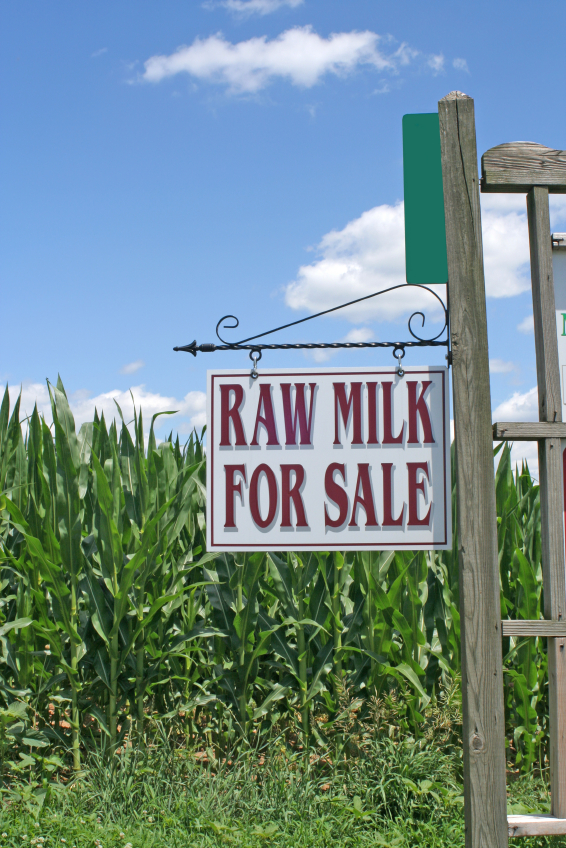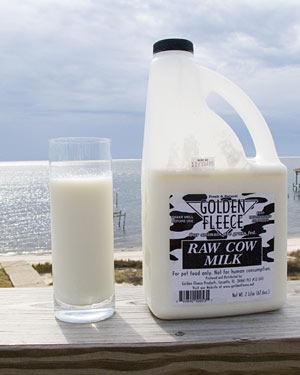 Sign from a farm in Pennsylvania, where raw milk can be legally sold.For the last seven years, Rae Lynn Sandvig, a mother of four, has been helping a local dairy farmer, Michael Hartmann, distribute unpasteurized milk to 35 or 40 friends and neighbors in her suburban Minneapolis community of Bloomington.
Sign from a farm in Pennsylvania, where raw milk can be legally sold.For the last seven years, Rae Lynn Sandvig, a mother of four, has been helping a local dairy farmer, Michael Hartmann, distribute unpasteurized milk to 35 or 40 friends and neighbors in her suburban Minneapolis community of Bloomington.
Every two weeks, the farmer pulls up in her home’s driveway, one stop among half a dozen or so other homes in the metropolitan area that serve as distribution points, and hands out jars of raw milk to customers who’ve placed orders. Sometimes, Sandvig buys half a steer from the same farmer, and divvies it up among four to six friends. (The USDA allows consumers to buy meat directly from the farmer that has been sold live, “on the hoof” and then slaughtered in a non-USDA inspected facility — or on the farm — for their personal consumption under certain conditions.)
Sandvig gets nothing from this arrangement financially, she says. There is one big benefit, though. “I’ve stood out there with other moms when it’s 20-below-zero, and in 90-degree weather, and we’ve become a community. It’s the way life is supposed to work.”
It’s not been working well over the last six months, though. Sandvig has found herself a target of the Minnesota Department of Agriculture (MDA), culminating in accusations over the past week that she is assisting in the illegal sale of raw milk. She has been threatened with “criminal prosecution or administrative penalties.”
By making Sandvig the first consumer to be caught up in the legal machinations, Minnesota seems to have opened a new chapter in the five-year-old war on raw milk. Up until now, government crackdowns around the country have focused entirely on farmers who run raw-milk dairies, along with managers of buying clubs and food clubs that help distribute milk, in states where its sale to humans is illegal. Raw-milk can be sold legally in certain states as pet food, or in so-called “herd shares.” (The Farm-to-Consumer Legal Defense Fund has a good map of the breakdown by state).
While Minnesota is one of the states that allows its sale, the farmer whose milk Sandvig was distributing has been linked to illnesses and has been prohibited by the Minnesota Department of Agriculture from selling dairy products. Until Minnesota went after Sandvig, the assumption by all involved, including the FDA, seems to have been that consumers are off limits, representing a kind of red line in the struggle that has seen the FDA and Centers for Disease Control push hard to discourage raw-milk consumption.
The FDA, responding to a suit by the Farm-to-Consumer Legal Defense Fund earlier this year on behalf of five consumers around the country, challenging the federal prohibition on raw milk sales, trumpeted the fact that no consumers have been prosecuted. “The government has neither brought nor threatened to bring a single enforcement action against consumers who purchase unpasteurized milk,” it said [PDF].
 This raw milk, bought in a Pensacola, Fla. co-op grocery, says on the label that it’s “for pet food only.” Riiight.Photo: Bonnie Azab Powell
This raw milk, bought in a Pensacola, Fla. co-op grocery, says on the label that it’s “for pet food only.” Riiight.Photo: Bonnie Azab Powell
Last May, Minnesota public health officials believed they had linked Hartmann’s farm to five illnesses from raw milk, shortly after which the Minnesota Department of Agriculture “embargoed dairy products on the Hartmann farm, prohibiting movement or release of the products off the farm.” (Several more were later announced as being connected to the farm.)
A few weeks after the initial outbreaks, Sandvig’s problems began. Investigators from the MDA, accompanied by local police, showed up at her home one morning, presented her husband with a criminal search warrant, and spent two hours going through the family’s refrigerator and questioning her about whether she was reselling milk, meat, and other food. She was “terrified, horrified, traumatized” by the home search, breaking down in tears in front of the seven investigators and police rummaging through her kitchen.
The event seemed even more threatening when she learned an MDA investigator had visited the homes of three of her neighbors who had shared in the milk and beef Hartmann delivered, seeking specifics about her food distribution practices. She says the investigator threatened these consumers with subpoenas that would require them to testify unless they allowed him into their homes to answer questions and look into their refrigerators, and then sign an affidavit listing foods they had acquired via Sandvig. The neighbors have since clammed up to her, she says, but one told her the investigator was particularly interested in packages of meat labeled “Not for Re-sale” on which the farmer had printed Sandvig’s name. Meat that is slaughtered or processed in a non-USDA-inspected facility is labeled this way to prevent its retail sale.
Then, just a few days ago, Sandvig received a registered letter from the MDA accusing her of “assisting in the sale of raw milk from your home in Bloomington” and offering her an “opportunity to be heard” in an “administrative meeting…before the department decides what if any enforcement action it will take against you for operating a food business without a license,” most notably “selling raw milk and selling food from unapproved sources.” Enforcement actions could include criminal or administrative penalties, the letter stated.
The meeting was originally scheduled for last week but is now being re-scheduled for January, Sandvig says. The Farm-to-Consumer Legal Defense Fund has agreed to represent her in the meeting and any proceedings.
An official of the MDA declined to comment on the case, except to point out that Minnesota law requires that targets of investigations be offered a chance to meet with agency officials and take issue with planned charges.
Hartmann has a long history of challenging Minnesota food laws. When prosecutors in his county charged him in 2002 with selling uninspected meat, he took the case to the Minnesota Supreme Court, and won a partial victory, based on a clause in the Minnesota constitution that allows farmers to “peddle” their food.
As a result of the June embargo on his farm’s products, Hartmann filed suit against the state, seeking a lifting of the embargo and the return of food the state had seized. He argued that the linkage the state made between illnesses and his farm was inconclusive, since tests on his farm’s milk had shown no pathogens. That led to a lengthy trial during the summer, attended by Sandvig and other Hartmann customers. The judge is due to issue a decision in the case before the end of this year.
The current raw milk situation has become complicated as well, because Minnesota agriculture officials have extended their investigation and actions well beyond seeking to limit Hartmann’s sales of milk and meat. For example, state and local officials raided a Minneapolis buying club, Traditi
onal Foods Minnesota, last June, and shut it down, even though it had no known connection to Hartmann. The shutdown was attributed to local retail licensing problems, and the buying club recently re-opened with additional permits. Officials also placed an embargo on a Minnesota farmer, Alvin Schlangen, even though he, too, had no known connection to Hartmann. He says he just received a letter similar to Sandvig’s, inviting him to a meeting with the MDA, preparatory to the possible filing of charges.
The Hartmann case flared up again two weeks ago when two MDA officials confronted Michael Hartmann’s brother, Roger, and seized 400 gallons of milk in front of a suburban Minneapolis home (not Sandvig’s). About 40 Hartmann supporters quickly gathered and loudly scolded the two MDA inspectors who carted off milk samples and arranged for a tow truck to cart off the Hartmann truck; the scene was caught on video, and posted on YouTube.
Sandvig isn’t saying how she’ll handle the upcoming meeting with the MDA. “I have nothing to hide,” she says, adding she’s already told them her side of the story during the search of her home last June.
She has concluded that the campaign against Michael Hartmann is part of “a vendetta” by the state against the farmer, based on his previous challenges of state authority. Including her in the Minnesota food-rights dragnet represents “overreaching by the government, wanting licenses and registration for everything.”
She adds, “I am on my own personal journey to keep learning about food.”
She’ll also be learning much more about the legal system, as she may well become a test case in an ominous new front in the struggle for consumers’ right to choose food straight from the farm.




